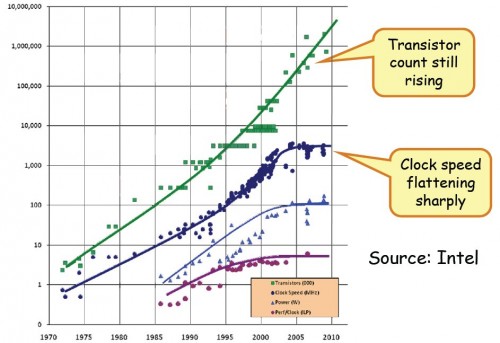So have we hit the limits of computation? Is computer science research no longer relevant since computers will not get significantly faster than they were in 2005? Quite the opposite in fact.
Moore's law has continued and we can still put more transistors in the same space. So instead of having faster CPUs, we have multiple CPUs or cores on our computers. We can parcel out our computation over these several cores so we can still get more and more work done. We also have cloud computing that let's us parcel out computations over several different machines that may or may not be in the same location.
The School of Computer Science was carved out of a College of Computing in 2007 and the research areas of the school aim to meet these new challenges. From computer architecture to design the models for these new machines and to deal with power issues that we have with even mutlicore computing. Systems research that helps parcel the work among these many cores and computer. Network research to connect the cloud computer with each other. Programming languages that need to understand the new modes of computing. New theoretical techniques to we can tackle larger computational problems by using smarter instead of faster algorithms, as well as new algorithmic thinking for these new machines. Not to mention the security and software engineering issues that arise from the new models.
The change in our computational thinking in 2005 doesn't stop CS research it just gives us new challenges and the School of Computer Science continues to lead the way in tackling these exciting questions.


No comments:
Post a Comment